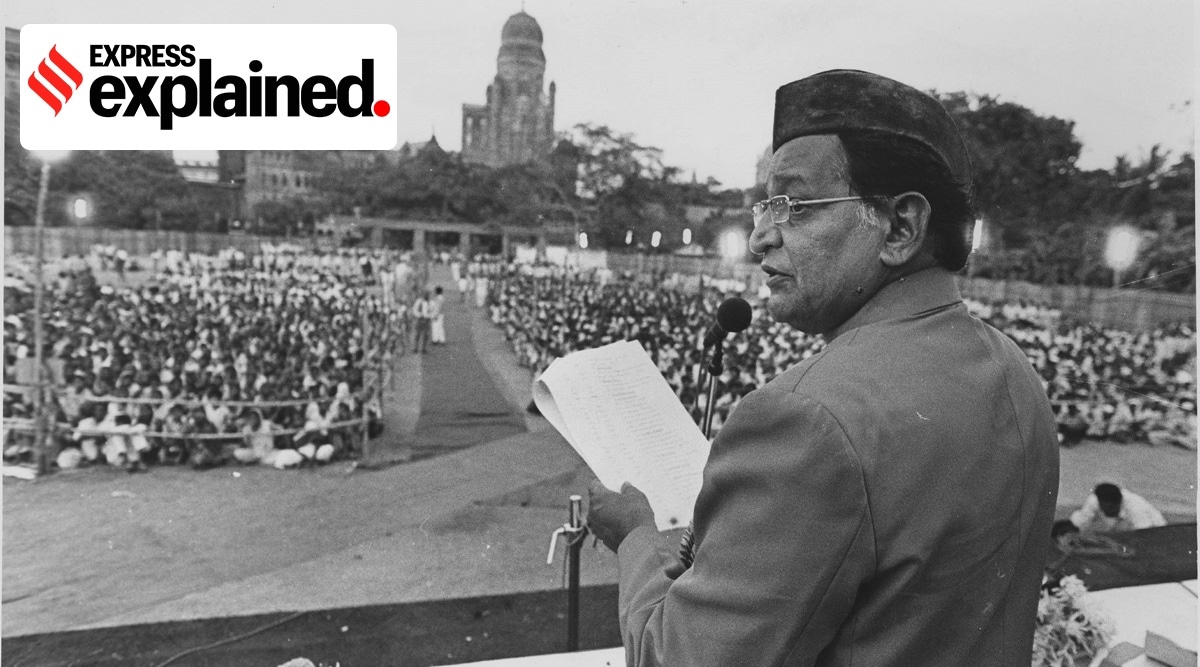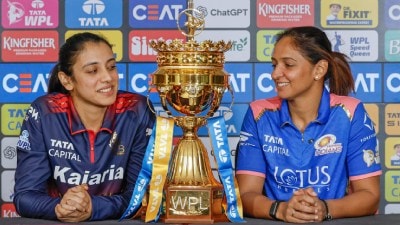Who was R S Gavai, Justice B R Gavai’s father whom the judge mentioned before Rahul Gandhi hearing?
Justice Gavai’s father, Ramkrishna Suryabhan Gavai (1929-2015), known as “Dadasaheb” to his followers and admirers, was the founder of the Ambedkarite outfit Republican Party of India (Gavai).
 RS Gavai was a close associate of Babasaheb Ambedkar, and chairman of the Deekshabhoomi Smarak Samiti in Nagpur. He was active in Maharashtra politics from 1964 to 1998. (Express photo by Mohan Bane/Archive)
RS Gavai was a close associate of Babasaheb Ambedkar, and chairman of the Deekshabhoomi Smarak Samiti in Nagpur. He was active in Maharashtra politics from 1964 to 1998. (Express photo by Mohan Bane/Archive) The Supreme Court on Friday (July 21) issued notice to the Gujarat government on a plea by Congress leader Rahul Gandhi challenging the High Court’s refusal to stay his conviction in the criminal defamation case.
While doing so, Justice B R Gavai, who headed the two-judge Bench also comprised Justice P K Mishra, offered to recuse from the case.
The practice of recusal — or withdrawal — from a case stems from the cardinal principle of the due process of law that nobody can be a judge in her own case.
Justice Gavai, who was elevated as a judge of the Supreme Court on May 24, 2019, is in line to become the second Dalit Chief Justice of India (CJI), after Justice K G Balakrishnan, who served as CJI from 2007 to 2010.
As per seniority, Justice Gavai is likely to take oath as CJI in May 2025, and will hold the office for a little more than six months.
So what did Justice Gavai say?
Since the matter concerned Rahul Gandhi, Justice Gavai disclosed his family’s affiliation with the Congress party, and asked the parties in the case to decide on whether he should hear the matter or not.
“There is some difficulty on my part,” Justice Gavai said. “My father was associated… Though he was not a Congress member, but he was associated with Congress and very closely… He was associated with Congress for more than 40 years. He had been a Member of Parliament, Member of Legislature, with support of the Congress and… And my brother is still in politics and is associated with Congress.”
“So in this background”, he told the parties, “you have to take a call whether I should take up the matter or not.”
Who was Justice Gavai’s father?
Justice Gavai’s father, Ramkrishna Suryabhan Gavai (1929-2015), known as “Dadasaheb” to his followers and admirers, was the founder of the Ambedkarite outfit Republican Party of India (Gavai). He served as the Governor of Bihar, Sikkim, and Kerala between 2006 and 2011, when the Congress-led UPA was in power at the Centre.
The senior Gavai was a close associate of Babasaheb Ambedkar, and chairman of the Deekshabhoomi Smarak Samiti in Nagpur. He was active in Maharashtra politics from 1964 to 1998. In 1998, Gavai Sr was elected to Lok Sabha from the Amravati constituency as a candidate of the RPI.
In 2009, as Governor of Kerala, Gavai Sr went against the recommendation of the state cabinet led by Chief Minister V S Achuthanandan and permitted the Central Bureau of Investigation to initiate prosecution proceedings against the current Chief Minister, Pinarayi Vijayan, in the SNC-Lavalin case, which was related to alleged corruption in a contract to modernise hydropower infrastructure in the state.
The Governor’s decision was backed by the Congress-led central government in court. The Congress-led UDF was then in opposition in Kerala.
And who is Justice Gavai’s brother?
Justice Gavai’s brother is Dr Rajendra Gavai. In 2009, Rajendra Gavai joined hands briefly with Ramdas Athawale, the current Union Minister for Social Justice and Empowerment, as an effort was made to bring together the various factions of the original RPI.
However, differences between the two leaders resulted in a split, and the Gavai-led faction had a pre-poll alliance with the Congress, while the Athawale-led group aligned with the BJP.
- 01
- 02
- 03
- 04
- 05





































